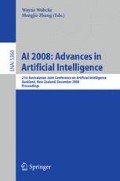Abstract
Analogical reasoning plays an important role for cognitively demanding tasks. A major challenge in computing analogies concerns the problem of adapting the representation of the domains in a way that the analogous structures become obvious, i.e. finding and, in certain circumstances, generating appropriate representations that allow for computing an analogical relation. We propose to resolve this re-representation problem of analogy making in a logical framework based on the anti-unification of logical theories. The approach is exemplified using examples from qualitative reasoning (naive physics) and mathematics.
Access this chapter
Tax calculation will be finalised at checkout
Purchases are for personal use only
Preview
Unable to display preview. Download preview PDF.
References
Indurkhya, B.: Metaphor and cognition: an interactionist approach. Kluwer Academic Publishers, Dordrecht (1992)
Kokinov, B., French, R.M.: Computational models of analogy-making. In: Nadel, L. (ed.) Encyclopedia of Cognitive Science, vol. 1, pp. 113–118. Nature Publishing Group, London (2003)
Hofstadter, D. and The Fluid Analogies Research Group. Fluid concepts and creative analogies, New York (1995)
Yan, J., Forbus, K., Gentner, D.: A theory of rerepresentation in analogy matching. In: Proceedings of the Twenty-Fifth Annual Meeting of the Cognitive Science Society (2003)
Kokinov, B., Petrov, A.: Integration of memory and reasoning in analogy-making: The ambr model. In: Gentner, D., Holyoak, K., Kokinov, B. (eds.) The Analogical Mind: Perspectives from Cognitive Science. MIT Press, Cambridge (2001)
Hasker, R.W.: The replay of program derivations. PhD thesis, University of Illinois at Urbana-Champaign, Champaign, IL, USA (1995)
Burghardt, J.: E-generalization using grammars. Artificial Intelligence Journal 165(1), 1–35 (2005)
Gust, H., Kühnberger, K.U., Schmid, U.: Metaphors and heuristic-driven theory projection (HDTP). Theoretical Computer Science 354(1), 98–117 (2006)
Plotkin, G.D.: A note on inductive generalization. Machine Intelligence 5, 153–163 (1969)
Krumnack, U., Schwering, A., Gust, H., Kühnberger, K.U.: Restricted higher-order anti-unification for analogy making. In: Orgun, M.A., Thornton, J. (eds.) AI 2007. LNCS (LNAI), vol. 4830, pp. 273–282. Springer, Heidelberg (2007)
Author information
Authors and Affiliations
Editor information
Editors and Affiliations
Rights and permissions
Copyright information
© 2008 Springer-Verlag Berlin Heidelberg
About this paper
Cite this paper
Krumnack, U., Gust, H., Kühnberger, KU., Schwering, A. (2008). Re-representation in a Logic-Based Model for Analogy Making. In: Wobcke, W., Zhang, M. (eds) AI 2008: Advances in Artificial Intelligence. AI 2008. Lecture Notes in Computer Science(), vol 5360. Springer, Berlin, Heidelberg. https://doi.org/10.1007/978-3-540-89378-3_4
Download citation
DOI: https://doi.org/10.1007/978-3-540-89378-3_4
Publisher Name: Springer, Berlin, Heidelberg
Print ISBN: 978-3-540-89377-6
Online ISBN: 978-3-540-89378-3
eBook Packages: Computer ScienceComputer Science (R0)

